Michael Bruce -
Loose Cannon
Interview by Mitch Lafon
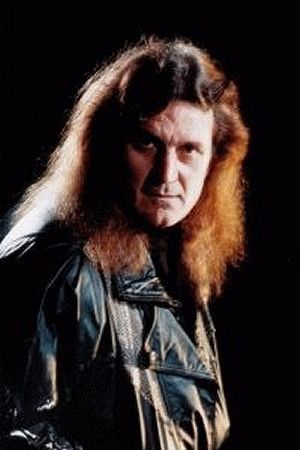
IIt started innocently with a Denis Dunaway interview at the beginning of October (to plug his amazing new Bones From The Yard CD) and grew into a seven part ‘Alice Cooper’ series. Along the way I’ve spoken with Alice, original drummer Neal Smith, current drummer Eric Singer, guitarist and musical director Dick Wagner, and current guitarist Keri Kelli. It was only fitting to contact the last of the original band and see if he was up for a chat and so with Neal Smith’s help I contacted original Alice Cooper guitarist Michael Bruce and we sat down for the following one hour chat on November 2nd (2006). Some might say I kept the best for last, but I prefer Michael’s take on it ‘you kept the loose cannon for last’ and with that I present the following candid chat with the man that wrote the early ‘hits’ for Alice Cooper and put his unique guitar stamp on the band’s original sound.
Mitch Lafon: I guess the first thing to find out is what have you been up to in the last few years?
Michael Bruce: “I was living in Texas and playing different places there then I moved to
Tucson and played a few shows there. I’ve been working with a guitar player friend of mine and just living the good life in the old Pueblo.”
ML: A few years back you put out the live album Halo Of Ice. Tell me about that album – was it important for you to play the Alice songs again and put your voice on them?
MB: “I had been doing them off and on and two brothers (Ingo and Silli Geirdal) who live in Iceland invited me up. So, I went and we did a couple of shows and we recorded one of them (this was back in ’02). Then I went back in ’04 and that time we did a DVD and I just released ‘Alive and ReCooperated – The Second Coming Of Michael Bruce’. This is a much better recording than Halo Of Ice...”
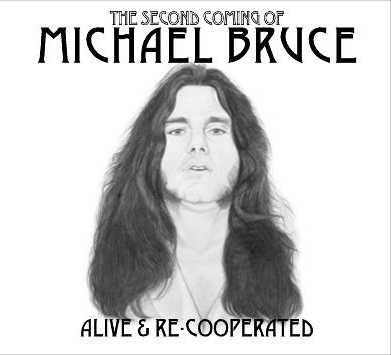 ML: Where was Alive And ReCooperated recorded?
ML: Where was Alive And ReCooperated recorded?
MB: “Reykjavik.”
ML: Another Iceland show...
MB: “Yes, it’s part of my Iceland series (laughs). Keep it on ice – frozen hits from the past. Just thaw when ready to use.”
ML: Same set list as Halo Of Ice?
MB: “No, we do a bunch of different songs and I do the words to ‘I’m Eighteen’, but with different music. Imagine ‘Rocky Mountain Way’ and ‘Revolution’ as the music to ‘I’m Eighteen’. It’s called ‘Forever Eighteen’. We also did a new studio version of ‘Muscle Of Love’ and songs like ‘My Stars’ (because we had a keyboard player with us this time), ‘Hard Hearted Alice’... a much more inclusive set. I’ll be selling it on www.myspace.com"
ML: You’ve been basically chilling out for the last five or ten years. Have you been writing new music?
MB: “Oh, yeah. I have a CD full of music, but I’m just waiting to see what would come of an Alice Cooper reunion and maybe use the songs for that. If not, I’ll release the songs ‘Michael Bruce’ style.”
ML: You mentioned the Cooper reunion and I know Neal had mentioned the ‘hopes’ of a Cooper reunion. However, Dennis feels that after so many years of being told ‘no’ – he gets the point.
MB: “Let’s put it this way – I really don’t know, but things have a strange way of happening. So, I just say a prayer every night before I go to bed.”
ML: It’s obviously something you’d like to see happen. Is it because the chemistry of the band was so good that you’d like to do it again or was it because the way it ended was so abrupt that you’d like to put a proper period to it?
MB: “For me... when you write music – you want to get it out to the largest audience you can. I have songs that I think would make great Cooper hits... There’s this one song called ‘Man Without A Heart’ that Neal heard and he really thinks it’s good and he’d like to see if Alice would be interested in it. I haven’t promoted it to Alice, but we’re getting together with Alice soon and maybe he’ll get to hear it. As for Dennis – he’s all gun-ho about his new album (Bones From The Yard) and doesn’t want to be bothered with anything else. I don’t know what Alice’s situation is, but we’re doing this benefit (the X-mas Pudding show) with him. It’s a good opportunity, but Dennis is tired of waiting around so he’s going to do his thing. That’s showbiz.”
ML: Tell me about the Pudding show. How do you approach a show like that?
MB: “For me, it’s just a drive down from Tucson and a couple of days rehearsal. I’ve been doing these songs on and off... they’re my tunes as much as the group’s tunes. I take every chance I can to play them and I do them without the theatrics and very much like Alice is doing them now – hard rock and they come off very good. They’ve met the test of time and they’re still fun to listen to.”
ML: Let’s talk about the past and I’ll ask you the same questions I asked Neal, Dennis and Alice. When the band broke up – and so far I’ve gotten three different stories – what’s your perspective on what exactly happened?
MB: “You can’t say the situation with Glen (Buxton) wasn’t a factor. On the other hand you can’t say that was the only reason.”
ML: To be clear – Glen’s situation was that he was abusing substances...
MB: “Well, he just wasn’t doing his job anymore and we tried to get him some help, but he just didn’t want it. I think everybody decided to go on their own... I know I did and when we wanted to get back together – I don’t think Alice wanted to do it without Glen (as far as replacing him with somebody else). So, he just went on and did his own thing – which in the long run turned out pretty good for me being one of the main writers. Every time Alice plays, he’s promoting the catalogue... so I’ve done well.”
ML: He certainly hasn’t disgraced the catalogue.
MB: “No no – he’s kept it alive.”
ML: And kept the royalties rolling in...
MB: “Yeah!”
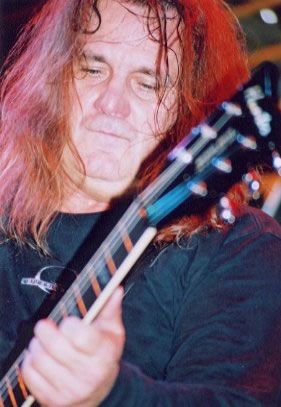 ML: Alice went on and played with Dick Wagner, but Dick had come in before to play Glen’s parts and stuff like that. Why was there no consideration to go on with Dick and just say ‘ok, you’re in’?
ML: Alice went on and played with Dick Wagner, but Dick had come in before to play Glen’s parts and stuff like that. Why was there no consideration to go on with Dick and just say ‘ok, you’re in’?
MB: “Glen wasn’t really doing his part and when we went in to do any recording – he wasn’t writing... he was just doing whatever Glen would do and then we’d go into the studio and have these songs written and there would be no Glen part. So, Wagner or Steve Hunter or Mick Mashbir or Bob Dolin or whoever (we had a bunch of different people come in not just Wagner) would come in and they would provide something that Glen would do. Glen carried on and he was on the Billion Dollar Baby tour till the end, but his participation was somewhat limited.”
ML: And, of course, Mick came in for Muscle Of Love...
MB: “Yeah and he was also there on Billion Dollar Babies. Glen was ill and in the hospital and when he came out we didn’t know if he’d know his stuff or not and we basically had to be prepared either way, so that was why he came in.”
ML: Now after the Muscle of Love album when everybody took time off to record solo albums and so on... You come back and Alice is not there for you anymore. What was that time like for you? When you realized the band doesn’t exist? What do you say to yourself?
MB: “Well you just carry on with your life. I know I did. I was living in Lake Tahoe at the time and I spent a lot of time with my family which was great because my mother passed away not too long after. She was only about sixty years old. It was a good time because we got to do a lot of family things together and so I’m glad I had the opportunity to spend the time and to be there and I was coming down from Arizona and finally moved down there and married a girl from Phoenix. So it was good in that sense, but musically it was kind of rough. I didn’t want to run off and start another band, so at the time I just kept on working on my material and I went in and did an album of my own music. It ended up being an album called “In My Own Way”.
ML: Yeah that’s a good album. It’s been re-released or it’s floating around as a double
CD.
MB: “Yeah, that was new millennium I believe.”
ML: How was that different from what you were doing with Cooper?
MB: “It’s more The Beatles side, the acoustic side, ballads and what not.
ML: After Alice moved on and did Welcome To My Nightmare and stuff - how did you accept those albums?
MB: “He was getting into theatrics and I remember him talking to us about the Nightmare show and about his dream and the dancing spiders and at the time-- he refers to this as the time where we only wanted to wear blue jeans and that wasn’t quite the case. If that was really his understanding of it or if that was merely a convenient thing to say when you’re not with the band anymore, but we had done Battle Axe which was quite an extensive show with costumes. It was probably as complicated if not more than any of the things he’s ever done, but we being the band and him being the name-sake just weren’t in a position to make it happen like we could with him. But I think it was just a case of him building up excitement and interest in what he was doing and trying to explain the past. He got it partly right but it certainly wasn’t... I think maybe at the time we weren’t too interested in doing the stage show because we had just done Muscle Of Love and... it was a good album, but it’s just unfortunately about the box, although it did go to #20, the box probably should have been lost after the first shipment of records because it was hard to merchandise. You know you learn these things after you know... that’s kind of show biz.”
ML: Up until Muscle Of Love, the albums had some kind of concept to them, at least they were tied together, but Muscle Of Love seemed more like a collection of songs. Was that something that was a band decision to just try and make sort of ten singles...
MB: “Well we were kind of like sailors on a holiday letting it all hang out. That’s kind of like where the idea for the cover came from. It was the material we had at hand... When the Stones do an album it’s basically a collection of what they’ve been doing for the last year or six months or whatever and maybe it’s because there was such concentration of stage energy and I certainly didn’t think Queen did a stage show for any of their stuff, but their stuff was certainly very theatrically oriented.”
ML: The band was known for the theatrics like we said and the reviews were always about Alice came to town and had a snake... Did that get annoying as a musician? Because the one thing people forget is that Neal Smith was an excellent drummer. Dennis Dunaway was an excellent bassist, and you were an excellent singer/songwriter...
MB: “I guess there was a fashion vacuum in that town (laughs).”
ML: Did it bother you that sometimes the theatrics overshadowed the actual musicality of the band?
MB: “No, because I always looked at the sales of the records and you don’t hear too much theatrics over the radio do you?”
ML: No.
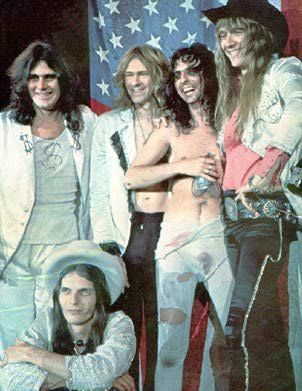 MB: “So I guess it’s the musicality of the album that to me said it all and we got to #1 and when you look at all the people behind us when Billion Dollar Babies went #1 - it was pretty impressive so that’s the bottom line. We were selling theatrics when people came to see it, we were selling records when people came to buy records and they were buying our records so I think it was like ‘love and marriage... Can’t have one without the other (laughs).’ It was a partnership of music and theatrics.”
MB: “So I guess it’s the musicality of the album that to me said it all and we got to #1 and when you look at all the people behind us when Billion Dollar Babies went #1 - it was pretty impressive so that’s the bottom line. We were selling theatrics when people came to see it, we were selling records when people came to buy records and they were buying our records so I think it was like ‘love and marriage... Can’t have one without the other (laughs).’ It was a partnership of music and theatrics.”
ML: That’s a very good point. Nobody has ever mentioned that, but it’s true that when it played on the good old AM radio and you heard ‘School’s Out’, nobody saw a snake or anything like that.
MB: “Yeah and that was kind of the neat thing that you were always wondering what the band was going to do when they came to town and when you think about this, could this have happened ten years later when MTV was out? We would have had to make videos of what we were doing and then you would have lost the whole element of surprise.”
ML: That’s another thing now with the internet for example. I remember the days back in the ‘70s going to shows and you’d be sitting there thinking is Alice going to play this song tonight, is Kiss going to play that song tonight. But now you go on the internet and you get the set list for the first night and you go ‘I don’t really want to see those five songs so maybe I won’t go to the show...’
MB: “Yeah I don’t know. I think we made it in the time that was our time and it kind of was over when it was over (laughs). And Alice is out there, he does all his new stuff, but he can’t not do the old stuff.”
ML: Do you follow the new stuff? Do you get a copy of Dirty Diamonds sent to you or do you go out and buy them?
MB: “No, I haven’t really followed him mainly because I haven’t really – nothing personal or anything, but the stuff he’s doing isn’t anything I do so I’m not really interested and it’s not because—I’m sure it’s good and as a matter of fact on the way back home (from the Chiller convention) I was listening to something from each album and I was really fascinated you know... the stuff he’s doing. I was listening to a Styx album and they had a song called Fallen Angel and...are you familiar with it?”
ML: No. I know Poison has a song called Fallen Angel (laughs).
MB: “There’s no Goth to it, no darkness to it and I guess it’s about some girl perhaps and it’s all very much...does Alice have a song called Fallen Angel?”
ML: I have no idea.
MB: “Anyway, if Alice did it - it would be theatrical and larger than life and blown way out of proportion. The perspective would be totally different and I think he’s gone different places with his concepts because other people aren’t. That’s why he’s Alice Cooper and not Frank Zappa. That’s what makes him unique.”
ML: Now back in the late ‘80s you’ve probably heard songs like ‘Poison’ and ‘House Of Fire’. Do you listen to those songs and think ‘man, it needs this guitar riff or Neal’s drums...’
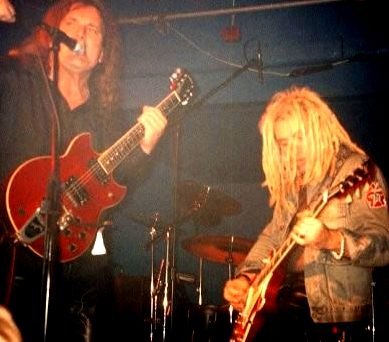 MB: “No, he had a hit with ‘Poison’ and I thought it was really really done well. I listened to it and it’s got some really neat stuff on it. Did Ryan Roxie play on that? I don’t really listen to his stuff and go ‘I could have played that’. I more or less listen to it and think ‘wow I couldn’t have played that (laughs)’ because it’s a different kind of guitar. It’s a different kind of attitude. It’s more of your ‘L.A. hired guns’ where they got the whammy bars white hot from use and it’s over the edge... everything’s over the edge.”
MB: “No, he had a hit with ‘Poison’ and I thought it was really really done well. I listened to it and it’s got some really neat stuff on it. Did Ryan Roxie play on that? I don’t really listen to his stuff and go ‘I could have played that’. I more or less listen to it and think ‘wow I couldn’t have played that (laughs)’ because it’s a different kind of guitar. It’s a different kind of attitude. It’s more of your ‘L.A. hired guns’ where they got the whammy bars white hot from use and it’s over the edge... everything’s over the edge.”
ML: Let’s look back at the albums – what did Love It To Death mean to the band and to you?
MB: “It was our third album and we felt it was a make or break situation. It was also our first adventure with Bob Ezrin and I knew that the way this man worked... I could tell he was putting everything he had into it. It was a lot of hard work and it paid off.”
ML: What made Bob Ezrin such a good record producer?
MB: “He’s a perfectionist and he’s thorough. There was no detail left undone. Everything from the tempo of the song to how he thought about the song to what’s going on in the song... that was all covered. ‘School’s Out’ wasn’t just ‘hey, it’s the end of school – play it like that’. We had a chorus of kids and everything was premeditated and thought out. Bob was also a child prodigy keyboard player. He’s from Toronto and I believe his parents were doctors. He was quite the pianist and we laid everything out on the piano like it was a Mozart movement.”
ML: Could you have made those albums without Bob?
MB: “Oh, yeah – we could have, but would they have turned out like they did? NOT at all... no way! He was our fifth Beatle. He was our George Martin. When he was done – I was like ‘this is what I wanted my song to be like’. Take ‘No More Mr. Nice Guy’ – it’s basically a rock song, but the way it’s done and the way it’s produced... it’s just done so well that there’s not a bad part in it. It was done just right you know and I take enormous pride in that. It’s textbook. It’s ROCK 101.”
ML: When you talk about producer Phil Spector – you talk about ‘the wall of sound’. What sound did Bob bring to Alice?
MB: “The BALLS of sound (laughs). We were the culmination of dark and light and that’s what we did in our shows (that contrast). We’d start off with what we called our ‘white set’ and kill Alice someway and he’d come back, be reborn, and then we’d be in our ‘dark set’... and Bob is the one who musically really made that happen. He filled in all the blanks and if there was a part that was going to be ‘ok make this scary’ – he’d have the moans or give some sort of idea of how to do the baby thing or you know. He’d do those little vignettes on the piano like ‘mommy, where’s daddy?’ and he made that happen.”
ML: And the sound on the third album from the first two was really night and day...
MB: “We were on our own on the first two albums. So, it was five minds turned loose in the studio and you got a helter skelter stampede... there’s a whole lot of ideas, but not one particular one that is followed through. Bob takes all of those ideas and puts them in a nice neat package with a title... I used to hate outlines in school because it forced you to focus on writing a paper and come up with a theme, subtitles... I’d want to put the whole thing down (on paper) and be done with it. Bob was our teacher in that aspect. He taught us how to go through it thoroughly and make a complete piece of music out of it. And I think that’s why it’s so good.”
ML: Tell me about the School’s Out album.
MB: “That was great. That was one of the more fun albums to make and Glen was really on the mark. We rehearsed and did some recording out in L.A. and we did some recording in New York. It was a fun album to do and was the most band like experience. Songs like ‘Blue Turk’, ‘Gutter Cat Vs. The Jets’ – Bob brought in that West Side Story element and we loved it... and ‘Luney Tune’. It was just the real spirit of the band – some of our blues with our NY sort of feels, but that Love It To Death and Killer...”
ML: I skipped Killer – what can you tell me about that album?
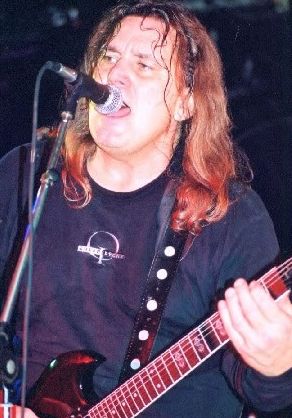 MB: “I think again that’s where the band was at - still pretty much intact and I think that after School’s Out we started working really hard and we were doing like two albums a year and we started leaving Glen behind. I don’t think he could keep up and I just don’t think he was prepared to work that hard. He either couldn’t or didn’t want to”.
MB: “I think again that’s where the band was at - still pretty much intact and I think that after School’s Out we started working really hard and we were doing like two albums a year and we started leaving Glen behind. I don’t think he could keep up and I just don’t think he was prepared to work that hard. He either couldn’t or didn’t want to”.
ML: Let me ask you about ‘Halo Of Flies’ from Killer. That song, Alice has said in other interviews that the band was getting sort of sick and tired of the reviewers saying ‘oh they’re all show no substance’ so the band sort of decided to give them a Yes song or an Emerson Lake and Palmer song and say ‘hey, we’re good musicians too’. Was that the case or was it sort of giving the middle finger to reviewers...
MB: “I guess from his point of view, it might seem that way... but this is exactly how Alice ended up being the interviewer. You ask somebody else in the band and you’ll get a totally different story and you talk to Alice and he sees it from... he’s not playing an instrument. For me, I ended up with a lot of song fragments and I used to string them together in sort of a loose format and I’d use them to warm up with and that’s where ‘Halo Of Flies’ began. And then of course we added other parts to it for the finished song but I don’t remember trying to measure up to Emerson Lake and Palmer (laughs). We basically made an instrumental with a little vocal part in the middle and it took on a life of its own”.
ML: It was totally unexpected because you’ve got a lot of three minute pop songs and then you’ve got this eight minute art piece.
MB: “Yeah and I think that that went back to the band’s early beginnings because we used to do jams and Bob used to say it’s cool to speed up and slow down as long as you do it together. As far as I’m concerned we were kind of masters at that and really good at doing these jams and we’d speed it up and slow down and ‘Halo Of Flies’ was certainly one of them”.
ML: Let’s move on to the big album Billion Dollar Babies. That’s what put you over the top. That was your...
MB: “Our Sgt. Pepper (laughs).”
ML: Yeah. Tell me about that one and Donovan and Keith Moon.
MB: “A lot of those people were around when we were recording and they wanted to do something with us and it was certainly that kind of an album. ‘No More Mr. Nice Guy’ was a tune I had written and had been around since Killer but it was just not a song that would fit on any of those albums, but when Billion Dollar Babies came around it was its time and that song—‘No More Mr. Nice Guy’ and ‘Billion Dollar Babies’ really set the mood for the album and then we kind of built it from there. I think it was more of a public album like we were celebrating our success. It’s worldly and in your face at the same time. “
ML: Let me get your perspective of the song ‘Billion Dollar Babies’. That was one of the first songs where the lead guitar riff wasn’t the crux of the song, but the drum ‘riff’ was...
MB: “I told Neal that I go to music stores and hear the (hums drum opening of BDB)... But it has a lot of little (guitar) riffs to start as opposed to one monster riff like in ‘Smoke On The Water’. It’s a solid song and when I hear it today it really holds up. It’s so powerful and it couldn’t be denied. We were hot at the time and it could be about ‘billion dollar baby’ meaning you got it so you flaunt it or about a girl. It had a lot of different faces that could be put on the song.”
ML: And Alice does a great vocal with those lyrics.
MB: “Oh, yeah and it’s hard to remember them – ‘slimy little monster greasy as a weasel in the alley been infected by the rabies’ – it’s a mouthful, but Alice is a word creator. He does great lyrics. More than anything what I really miss is having somebody who can get up there and sing and create great lyrics for a piece of music. That’s one thing I really miss about working with him.”
ML: What is the quintessential Alice Cooper album?
MB: “Billion Dollar Babies. It’s got great pieces like ‘Mary-Ann’ and Alice wanted to put his macabre twist on it and yet the album had songs like ‘No More Mr. Nice Guy’ and ‘I Love The Dead’... It ran the gamut, but each of the albums were so distinct that even Muscle Of Love and not doing it with Bob Ezrin was distinctive in its own way because it wasn’t Bob Ezrin it was Jack Douglas and Jack Richardson who were people we worked with all the time with Bob. It was the same sort of thing, but without the big theatrical piece. Each album seemed to have its own character to it. I think it’s what The Beatles had going – each album they had done had a real character and a flavour to it that stood out. When you listen back to Rubber Soul...”
ML: They were iconic because when you listen back to Rubber Soul or Abbey Road – it’s not just different songs, but it’s different hair cuts, different outfits... They were selling pop, fashion and philosophy...
MB: “Yes, they were and we weren’t doing it to that extent, but we were on that track.”
ML: When you look back at your albums now – there’s a very discernable difference in the point of view of each album.
MB: “Yeah.”
ML: Let me ask you about the song ‘I Love The Dead’ – there’s a little ‘controversy’ as to who really wrote the song. Dick Wagner claims he wrote the song with Alice, but that his credit was taken off... What’s the story?
MB: “Dick Wagner? ‘I Love The Dead’?
ML: That’s the ‘controversy’.
MB: “From what I remember, it was a song that was worked up by Bob, Alice and Wagner together. I don’t know anything more about that, but I do know they didn’t have an ending to it and I came up with the major chord change (sings ‘I Love The Dead’) –the up cheer-y part I wrote and I noticed I didn’t get any credit on it, but that’s ok. Those guys were working so much on the feeling of the first part of the song that they never got to where the song was going as a whole.”
ML: Did it bother you back then that other guitarists like Dick were brought in?
MB: “It didn’t really bother me you know. I had written a lot of stuff with the band and ‘I Love the Dead’ is a good example where I didn’t get any credit on that because people thought that I wrote so much of the stuff that it’s not going to matter ‘to Michael’ and I wrote some stuff for a couple of Neal songs and Dennis’ song ‘Black Juju’... I worked with them, but didn’t get any credit because that was my job in the band. I was one of the writers and I was on salary to do that. If I didn’t like the song they’d come up with then it was my job to work on it whether or not I got any credit.”
ML: The most remarkable thing about Alice Cooper (the band) was that it seemed that everybody had their part to play and they did it to their best ability. It was like a football team...
MB: “We were ‘special teams’ (laughs) or like I like to say ‘special foreskins’”
ML: Or ‘Special Forces’ by the ‘80s. When you saw Alice in the early ‘80s...
MB: “The dark period.”
ML: He looked like death. How did that make you feel? Did you call him up? Did you call up the other guys and say ‘what the hell?’”
MB: “I didn’t. I saw his parents and went to the shows. I didn’t know what to make of it. I didn’t know how much of it was deliberate and what he was going for or how much of it was something else (you know what I mean).”
ML: I was watching a clip of him on the Tom Snyder show the other day and he looked like a talking cadaver. It was disturbing.
MB: “Well, I guess he made that happen.”
 ML: Let’s finish off with reunion talk – would you like to work again as a band and is it possible without Glen being there?
ML: Let’s finish off with reunion talk – would you like to work again as a band and is it possible without Glen being there?
MB: “I think we’ve played long enough to know that Neal, Dennis and I could probably swing it. I think the question mark is Dennis with him doing his thing now and Alice doing his thing – is there ever going to be a time where it’s right for everybody? I’m hoping Dennis will get out there and get a chance to get his feet wet and go through... I know I had a greater appreciation for the band after I did ‘In My Own Way’ and some of my solo stuff. I realized what a good thing we had.”
ML: Is Dennis really that reluctant? If Alice phoned him tonight and said ‘Dennis – you know what on the 16th of December it’s the start of the reunion. Are you in?’ Would he really say...
MB: “I don’t know. I know he’s really gun-ho on wanting to do his thing and it may just have to run its course. I’m not sure. He said a couple of things in rehearsal about him wanting to do something with Alice and waiting and waiting and it never happened, so he might be done waiting.”
ML: He said the same thing in the interview I did with him. If you did a reunion something with Alice would you want it to be just a nostalgia tour or would you like to sit down in the studio and come up with new Alice music and could you come up with new Alice music. After all, it’s been thirty years.
MB: “I’ve got a song right now (well, just the chorus) which is called ‘Born Screaming’ and it’s a real Cooper song. It’s like ‘No More Mr. Nice Guy’ because of its really intense guitar riff... I’ve got ‘he was a born screamer’ and Alice could easily come in and write all the lyrics to that and I’m sure they’d be wonderful, but on the other hand... I could see the band going and doing a greatest hits tour. We’ve talked about doing the Billion Dollar Babies show over in the UK because we never did it over there.”
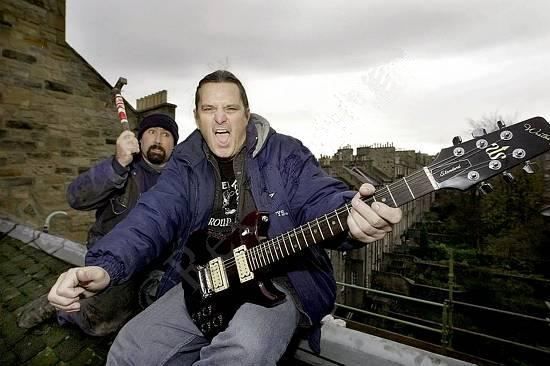
ML: You mean the band Billion Dollar Babies?
MB: “With Alice over in the UK then filming it and maybe that’s all it is... we can’t do Nightmare because we wouldn’t really want to and that’s his solo stuff. The band has a lot to offer if we did everything up to Nightmare.”
ML: Let me make sure I understand – you’ve talked about taking the band over to the UK next summer (2007) and doing the Billion Dollar Babies show with Alice Cooper singing.
MB: “Yeah – we never did Billion Dollar Babies in the UK. So, the songs would all be there and we’d do it like it’s just came out with the stage show and everything.”
ML: Is this currently on the table?
MB: “No, this is something that Neal, Dennis and I talked about at one time. Whether it could happen now – I don’t know. I could see us going out and doing some shows – greatest hits basically. That would be easier, but Alice has said many times that he doesn’t want to go back – yet he’ll make an album and say ‘this is my ‘Love It To Death’ sound. So, he goes back when it’s convenient I guess. I don’t know if that’s the same thing as going back with the band – maybe not.”
ML: If you did a reunion album what kind of sound would you like to have on it? Would you like a more modern down tuned guitars thing...
MB: “I would like to go back and make it the way we are now and see if that could be appealing enough. I think that that particular period of music would be very refreshing now and that people would like to go see it. The Billion Dollar Babies tour with ‘I’m Eighteen’ right up to the present would be very cool.”
ML: As a fan, I would love to see you take on a couple of songs from his solo career like ‘Welcome To My Nightmare’ or ‘Poison’ and really just make them Alice Cooper songs.
MB: “That would be terrific. That would be the interesting part. ‘Poison’ would probably be very different.”
ML: Anything we should plug?
MB: “Well, the myspace site and the www.michaelbruce.com [now gone]. As well as the new CD - The Second Coming Of Michael Bruce - Alive And ReCooperated.”
Mitch Lafon is:
Senior Writer & Staff Photographer-- BW&BK
Listen to the "Mitch Minute" on Ottawa's #1 station - Majic 100.3 FM
Contributor - www.knac.com
